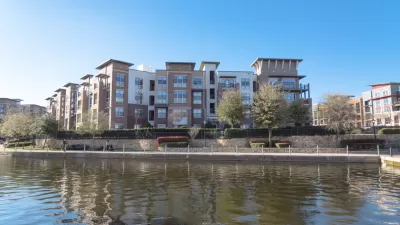Joel Kotkin looks at a new analysis of Census data by Wendell Cox that may upend the "conventional wisdom" that "talented, highly-skilled and highly educated people" are clustering in America's coastal cities.
Using data that depicts the change in the number of people with bachelor's degrees in the 51 largest metropolitan statistical areas in America from 2000-2010, Kotkin concludes that, "In the past decade, the metropolitan areas that have enjoyed the
fastest growth in their college-educated populations have not been the
places known as hip, intellectual hotbeds." Hence, he finds that rather than clustering in select "hip" cities, "brainpower is spreading out."
"In reality," Kotkin argues, "skilled, college-educated people are increasingly now
scattered throughout the country, and often not where you'd expect
them. For example, Charlotte, N.C., Columbus, Ohio, Kansas City and
Atlanta now boast about the same per capita number of college grads as
Portland and Chicago, and have higher per capita concentrations of
grads over the age of 25 than Los Angeles."
It probably isn't shocking to see that the fastest growing cities over the last decade (Las Vegas, Raleigh, Austin, Charlotte, Riverside) also grew by the highest numbers of college grads. Kotkin attributes the growth of college grads in these areas to three key factors that invariably attract any American - "lower home prices, better business climate, job
opportunities."
"Looking ahead," Kotkin concludes, "we can expect this trend to continue, particularly as
the current bulge of millennial graduates mature and start to look for
affordable places to live and work. Regions that maintain strong job
growth, and keep their housing costs down, are likely to keep gaining on
those metropolitan areas celebrated for being the winners of the race
for educated people."
FULL STORY: The U.S. Cities Getting Smarter The Fastest

Alabama: Trump Terminates Settlements for Black Communities Harmed By Raw Sewage
Trump deemed the landmark civil rights agreement “illegal DEI and environmental justice policy.”

Study: Maui’s Plan to Convert Vacation Rentals to Long-Term Housing Could Cause Nearly $1 Billion Economic Loss
The plan would reduce visitor accommodation by 25% resulting in 1,900 jobs lost.

Planetizen Federal Action Tracker
A weekly monitor of how Trump’s orders and actions are impacting planners and planning in America.

This Toronto Suburb Has More Bus Riders Than Columbus, Ohio
Brampton, Ontario used gradual improvements in service to prove that if you build it, they will ride.

Paris Bike Boom Leads to Steep Drop in Air Pollution
The French city’s air quality has improved dramatically in the past 20 years, coinciding with a growth in cycling.

Why Housing Costs More to Build in California Than in Texas
Hard costs like labor and materials combined with ‘soft’ costs such as permitting make building in the San Francisco Bay Area almost three times as costly as in Texas cities.
Urban Design for Planners 1: Software Tools
This six-course series explores essential urban design concepts using open source software and equips planners with the tools they need to participate fully in the urban design process.
Planning for Universal Design
Learn the tools for implementing Universal Design in planning regulations.
Smith Gee Studio
Alamo Area Metropolitan Planning Organization
City of Santa Clarita
Institute for Housing and Urban Development Studies (IHS)
City of Grandview
Harvard GSD Executive Education
Toledo-Lucas County Plan Commissions
Salt Lake City
NYU Wagner Graduate School of Public Service




























